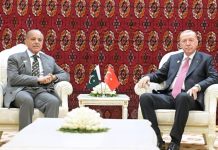By Anzal Amin
ISLAMABAD: President Dr Arif Alvi on Wednesday said that higher education was of paramount importance for accelerated economic growth and development of the country.
The president expressed these views while addressing the Members’ Convocation of the Institute of Cost and Management Accountants (ICMA), at the Aiwan-e-Sadr. While highlighting the importance of professional education, the president said that institutions should take effective measures for skill-based and professional education.
He said that the graduates could play key role in the development of the country, adding Pakistan was in dire need of trained human resources and professionals, including cost and management accountants.
He urged the institutions to increase the number of university graduates and professionals and said that professional institutions should produce more graduates because the industry and market were in dire need of skilled professionals.
The president observed that corruption and non-merit caused deterioration in the institutions and the country. He said that corrupt practices were found even in a western country and during Covid-19 where people claimed wages on fake identities.
He said that the main reason behind the financial crime was the collusion of the officials with the criminals, adding that corruption and leakage should be stopped.
The president said that enacting clear laws, ensuring their stringent and fair implementation, imparting justice through the due process of law, and inculcating self-accountability would pave the way for discouraging corruption and corrupt practices.
President Dr Arif Alvi also commended ICMA for producing the cost and management accountants in Pakistan. He urged the members of the financial and accounting sector to provide leadership to help in the documentation of the economy, discourage theft and tax avoidance, curb corruption and help the government to generate just and fair taxes and revenues.
He advised the students to have a passion for serving the country and the needy people for mitigating their hardships. President ICMA Pakistan Shehzad Ahmed Malik and members of the accounting and financial sector and students attended the ceremony.
President ICMA, in his address, highlighted that the members of ICMA were known for their expertise in the areas of business planning and development, operational management, financial management, cost management, risk management, taxation and corporate affairs. The members of ICMA were serving within Pakistan as well as abroad, he added. Earlier, President Dr Arif Alvi awarded final qualification certificates to the graduating students.
Meanwhile, President Dr Arif Alvi on Wednesday said that a well-integrated and effective awareness campaign about mental health and reducing the stigma against mental illnesses were essential for building a healthy society.
The president, chairing a meeting on mental health at Aiwan-e-Sadr, said also emphasized the efforts to strengthen the existing infrastructure and create awareness using online mental health portals, virtual programs, artificial intelligence, mental health chatbots, helplines, mobilizing relevant government and other stakeholders, and forging public-private partnerships.
Dr Irfan Mustafa, Chief Executive Officer of Taskeen Health Initiative, a non-profit organization working for the promotion of well-being and prevention of mental illness in Pakistan, attended the meeting.
The president said there were more than 200 classified forms of mental illness, including behavioural or emotional disorders, depression, bipolar disorder, dementia, and schizophrenia etc, which if diagnosed and managed at an early stage, could be cured in a cost-effective manner or incurring no cost at all.
This, he said, would reduce the burden on the system of curative care which was expensive, unavailable to most of the population and lacking in trained and qualified human resources.
The president noted with concern that mental disorders accounted for more than 4% of the total disease burden with a higher prevalence of mental health burden among women.



